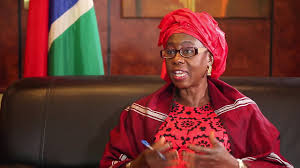Banjul, May 4-5, 2021

Remarks for Vice President Dr. Isatou Touray
The Ambassador and staff of the EU delegation to The Gambia
World Bank Representative
The Mayor of Kanifing Municipal Council,
The mayoress of Banjul city Council
The Chairman Brikama Area Council
The Hon Minister and Representatives from the Ministry of Finance and Economic Affairs
The Executive Director and Staff of National Disaster Management Agency and National Environment Agency
Other Government Officials present
Officials from Development Partner Institutions
Excellencies, Ladies and Gentlemen,
- Almost a year ago, we gathered to launch The Gambia Integrated Urban and Coastal Resilience Program that our Government initiated with the World Bank,with support from the EU. It is my pleasure to welcome you all to this Workshop today for the discussion on the final results of the Flood and Coastal Risk Assessment and Identification of Investments under this technical assistance Program.
- Global climate risks have been accelerating in recent decades, with higher than expected sea level rise, average temperatures and extreme weather events such as floods, droughts and windstorms. The conjunction of climate change,growing environmental degradation and urbanization patterns is reshaping flood and drought risks in The Gambia and will likely increase the impacts of future events in our national economy and people’s livelihoods.
- The coastal and river zones of the Gambia provide important natural resources for income and food security and contribute significantly to the country’s development through tourism, the provision of employment and transportation.These areas are increasingly prone to erosion and flooding.Only in the last rainy season, about 50 thousand people have been affected by flooding throughout the entire country (NDMA reported). Similar events happened in the previous years with significant social and economic impacts.
- The Greater Banjul Area (Banjul City, Kanifing Municipal Area and parts of the West Coast Region) is among the most affected by climate risk. The main drivers of risk are urbanization on the one hand (especially in the coastal areas), and the exposure to floods, erosion and the general climate change effects on the other hand. In particular, Banjul city has an average elevation of only 80 cm above Mean Sea Level (MSL), which makes it highly vulnerable. The terrain in the city is almost flat which poses significant drainage challenges. Under climate change projections from the IPCC,rainfall will become highly erratic. These and other characteristics put Greater Banjul Area amongst the most vulnerable areas in the country to climate change.
- The Government has made very important advances in the climate and disaster risk management agenda. For example, The Gambia has developed a National Policy on Disaster Management, a Strategic Framework, a Multi-Hazard Contingency Plan,and the National Disaster Risk Reduction Plan (2019-2030) under the leadership of NDMA. This Plan specifically recognized the need to integrate climate change adaptation with disaster risk management and is committed to assessing risk as an initial step to develop innovative and sustainable strategies for disaster management and financing.
- The Gambia’s Vision 2020 and more recently the Climate Change Priority Action Plan (CCPAP) has identified 24 cross-sectoral activities that contribute to mainstreaming of climate change into the national development process.The CCPAP will also lead to the development of a Low Emissions Carbon Development Strategy that will allow Gambia to continue to follow a green economic development pathway.
- The World Bank and the European Union, along with other Development Partners, have been our partners for several years and supported the Government of The Gambia in addressing the country’s climate and infrastructure development challenges.In particular, we are very pleased of the support of the World Bank and of the EU for The Gambia Integrated Urban and Coastal Resilience Program. The Program, which results are presented today,is supporting our climate adaptation and disaster risk reduction agenda, by informing on the risk of flooding and coastal erosion in the GBA and by proposing a set of priority investments for the GBA.
- We look forward to taking advantage of these studies and continuing working with different Development Partners to move to the implementation phase and finance the proposed investments. We welcome the opportunity to be part of the World Bank Regional Initiative for the West Africa Coastal Areas– WACA to explore opportunities to mobilize initial resources to tackle some of the identified challenges in coastal erosion, flooding, and climate change adaptation. Our Government is committed to improving the resilience of our communities, our economy,and to unleashing innovation for a healthier and more prosperous future.
Ladies and Gentlemen
- For this reason, I look forward to your active participation and discussion on potential priorities for the country, we count on your technical knowledge and your inputs to improve and enrich the results of the program.
- Thank you very much for your attention.

